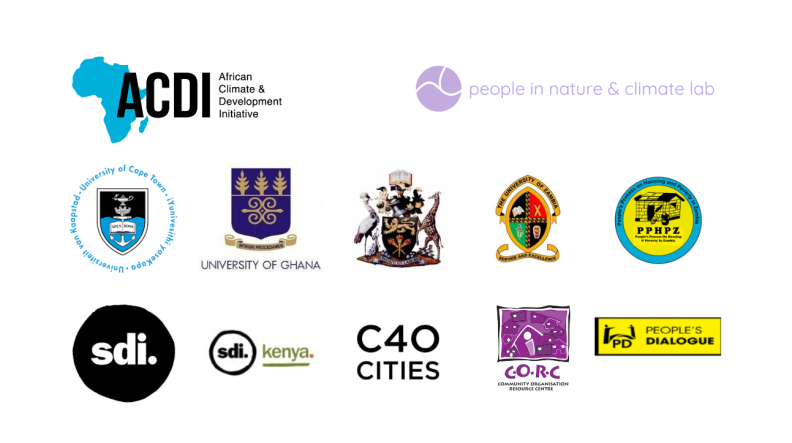Let’s be together for equitable urban nature-based solutions for climate change adaptation
Tuwe Pamoja means “Let’s be together” in Swahili, signifying our aim to bring together city residents, officials, NGOs, community groups and researchers from four African cities. Together, we want to strengthen the capacities of city actors to plan and implement climate resilient nature-based solutions that are locally driven, effective, and equitable for all urban residents.
The project runs in informal settlements in Accra, Cape Town, Lusaka and Nairobi from May 2024 to December 2026. Work is concentrated on three themes of nature-based solutions (NbS), climate risk and intersectionality.
Read more about the project here
Our Objectives
The Tuwe Pamoja objectives are to better understand the lived experiences of people in informal settlements, and to better plan nature-based solutions that holistically account for diverse needs and climate risks at neighbourhood levels. Learn more here.
- Understanding diverse lived experiences - For understanding intersectional lived experiences of climate-related risks and NbS.
- Planning together for more resilient futures - To deliberate the trade-offs, synergies, costs and co-benefits of NbS within climate-resilient development pathways (CRDPs).
- Sharing learning within and across city contexts - To support the design and implementation of equitable urban NbS across regional and international networks.
Our Goal
Strengthening capacity in African cities to harness locally-driven, equitable nature-based solutions for climate resilient urban development.
Through our three-pronged focus and commitment to the Tuwe Pamoja objectives, our goal is to deliver strengthened capacities for planning and implementing climate resilient nature-based solutions that centre the voices of marginalised residents in informal settlements.
Our Team
Tuwe Pamoja is led by a consortium of non-governmental and community-based organisations, research institutes and regional sub-Saharan African networks.
The project is led by two principal investigators committed to Tuwe’s core themes of nature-based solutions, climate risk and intersectionality. City academic leads are from the University of Cape Town, University of Ghana, University of Zambia and the University of Nairobi.
City non-governmental (NGO) and community-based organisation (CBO) leads are from Slum Dwellers International (SDI) affiliates, with country leads and local community organisers based in each key city. Regional sharing and impact activities are carried out by all project team members, including SDI, and C40Cities.
Tuwe Pamoja is coordinated and managed by researchers from the African Climate and Development Initiative (ACDI) at the University of Cape Town, including those at the PiNC Lab.
Tuwe Pamoja is funded by the CLimate adaptation & REsilience programme (CLARE). CLARE is a flagship research programme on climate adaptation and resilience, funded mostly (about 90%) by UK Aid through the Foreign Commonwealth and Development Office (FCDO) & co-funded by the International Development Research Centre (IDRC), Canada.
